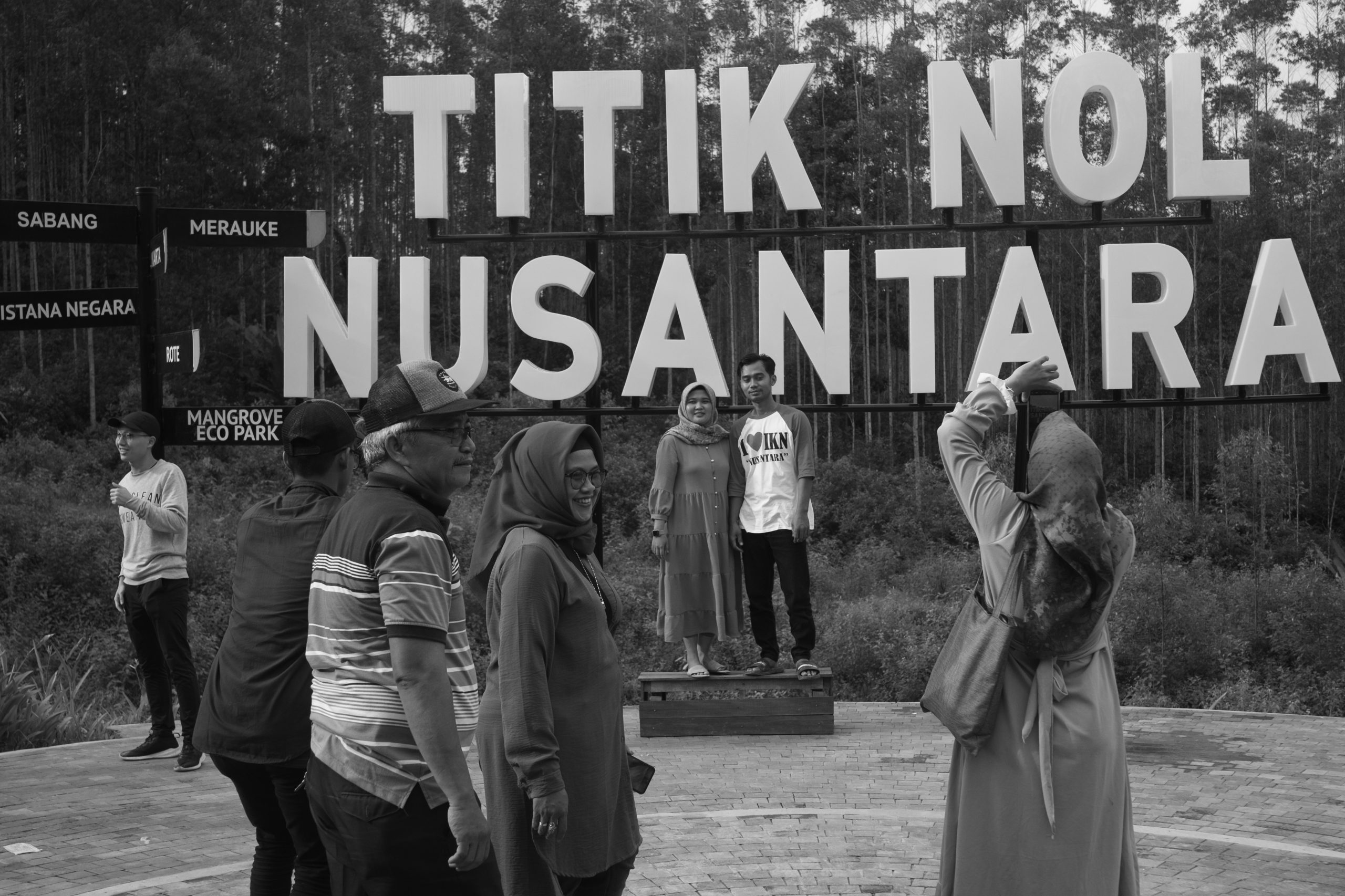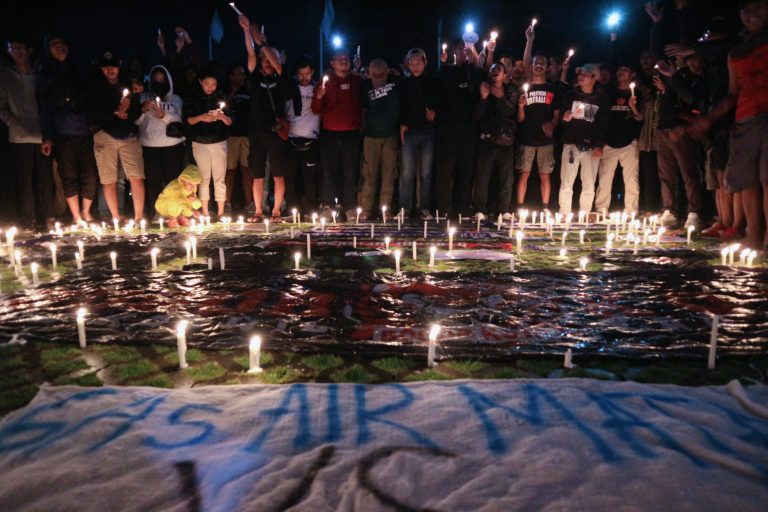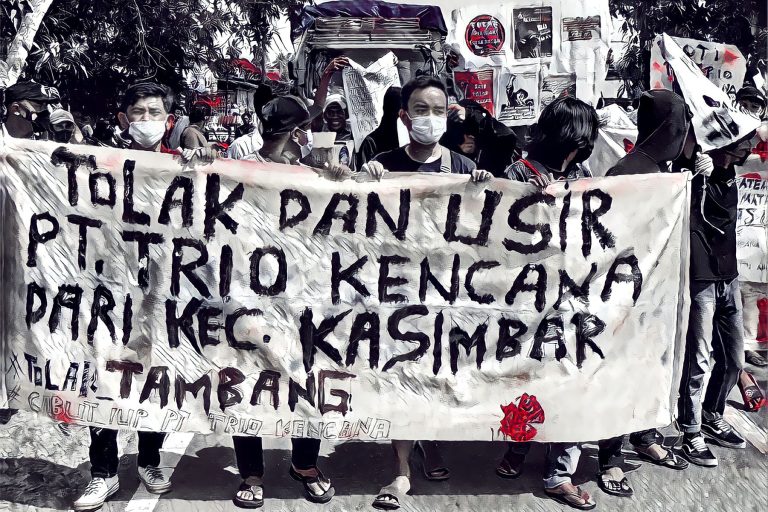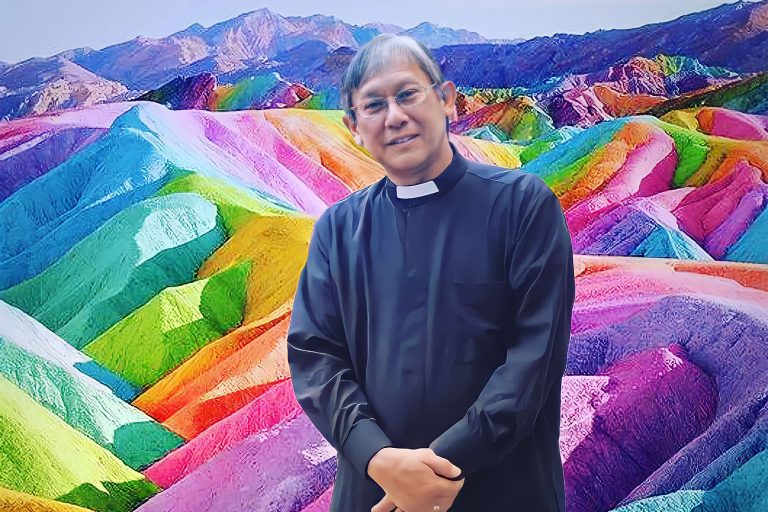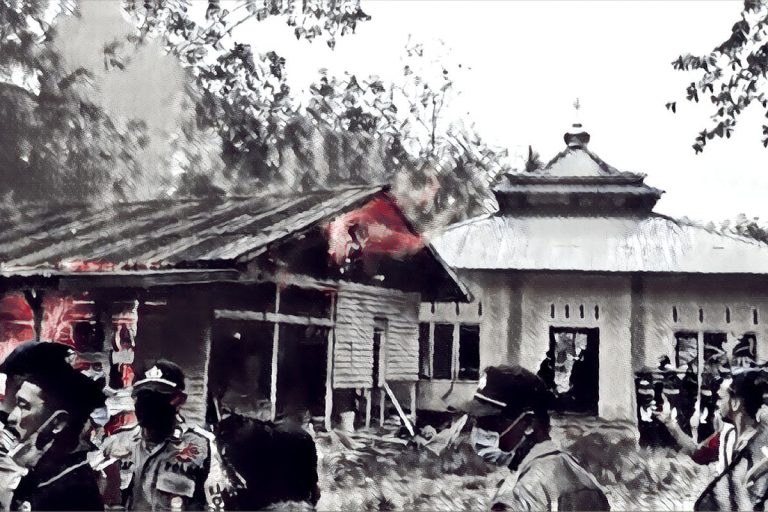The Jokowi administration has put its planned new capital city up for sale with massive incentives for investors, including tax holidays and the right to build for 160 years.
Whenever President Joko “Jokowi” Widodo asks the Indonesian Chamber of Commerce and Industry (Kadin) to splash the cash for his latest ambitious development project, they say yes.
On Oct. 18, 2022, Kadin presented hundreds of businesspeople before President Jokowi at the Djakarta Theater. At the event, Jokowi hawked the new capital, making comments like “What more do you want?” and “You don’t need to question anything else”. Indonesian netizens disparagingly likened the performance to local TV presenter Feni Rose, who regularly urges her viewers to buy real estate as soon as possible, using the catchphrase “Senin harga naik” (the price will go up on Monday).
In the case of the new capital, the price really did go up on Monday. One of the businessmen Jokowi pressed for investment at the Kadin forum was Budiarsa Sastrawinata, the managing director of property conglomerate Ciputra Group as well as the chairman of Kadin’s new capital city working group.
Before Jokowi announced the new capital city, Ciputra already had 870 hectares of reserve land in East Kalimantan. Once it was announced, property developers like Ciputra immediately raised the price, as was done by Agung Podomoro Land for the Borneo Bay City Apartment in Balikpapan, one of the cities closest to the new capital, from RpRp700 million to RpRp1 billion per unit.
The reciprocal relationship between the government and Kadin has a long history. It reached its peak when the Jokowi administration proposed the controversial Job Creation Law. The all-encompassing “omnibus” piece of legislation revised 82 laws with more than 1,000 articles in one fell swoop, in a move that many experts and activists said disproportionately favored business elites while weakening protections for workers. Then-chairman of Kadin was involved as the head of the Omnibus Law Task Force. He is now the Indonesian ambassador to the United States.
Throughout Jokowi’s tenure as President, Kadin has provided the connections the former furniture businessman has needed to reach domestic and foreign investors. In return, Jokowi has given Kadin a prominent seat at the table, and the most recent manifestation of this symbiotic relationship is the planned national capital of Nusantara in East Kalimantan.
Our research shows that President Jokowi has involved at least two organizations outside the government, Kadin and Real Estate Indonesia (REI), in the lobbying of potential investors abroad.
The government claims that 300 foreign and domestic investors are interested in putting money in the new capital city. Out of these, according to Trend Asia research, at least 85 foreign investors are affiliated with Group of 20 and Group of Seven countries. The potential investors have been lobbied by the President and even business entities in various forums. This does not include lobbying from the Capital City Authority at international economic forums.
But despite Jokowi’s full court press, few foreign investors have made any firm commitments to put money in the new capital. In fact, several, including Madrid World Capital of Construction, Engineering, and Architecture (MWCC), the France Development Agency (AFD), and Softbank, have announced the withdrawal of their interest.
MWCC questioned the potential of developing the capital’s buffer zones for the general public to live in, while the AFD withdrew after considering the results of an investment feasibility assessment.
The capital’s apparently dubious business potential has also confused a number of Japanese entrepreneurs. During one tour with the Investment Ministry of the site of the planned capital, media reported that one Japanese businessman who asked not to be named said it was hard to imagine what they would be investing in, given that the site was still essentially a jungle.
Conflicts of Interest Abound
What the investors really want, but may be reluctant to say, is reassurance that the new capital will not be scuppered midway over a change in administration or policy direction. Jokowi, after all, is nearing the end of his second and, at least according to the current constitution, final term.
At the tail end of 2021, Jokowi sent a letter to the House of Representatives requesting the start of deliberations on a draft bill that would enshrine the new capital city into law. Delivered by State Secretary Pratikno and National Development Planning Agency head Suharso Monoarfa, who is also the chairman of the United Development Party (PPP), the letter was received directly by House Speaker Puan Maharani, the daughter of Indonesian Democratic Party of Struggle (PDI-P) matriarch Megawati.
The House duly formed a committee on Dec. 7, 2021. Then, just 42 days later, the House passed Law No. 3/2022 on the state capital, and President Jokowi signed it the next month. It was a swift legislative process for a megaproject that would require Rp466 trillion to complete. For comparison, a draft bill to outlaw sexual harassment and other forms of sexual violence was stuck in the House for six years before finally passing in April 2022.
Summary of the State Capital Law
Area
Article 6, paragraph 2: The state capital covers a land area of some 256,142 ha and a sea area of some 68,189 ha.
Article 6, paragraph 3: The land area includes the capital area of some 56,180 ha and the development area of some 199,962 ha.
Capital City Authority:
Article 4, paragraph 1b: The Capital City Authority is a ministry-level institution.Article 5, paragraph 3: The state capital will only hold general elections at the national level.Article 5, paragraph 4: The head of the state capital administration will be appointed and dismissed by the president after consulting with the House of Representatives. The Capital City Authority holds power as policymaker and regulates the state capital area. The new capital city will only have one government agency and no Regional Legislative Council (DPRD).Article 10: The terms of the head and deputy head of the Capital City Authority will be 5 years. The President may appoint and reappoint [people to the position] with the same term of office and can dismiss them at any time. The board of the Capital City Authority is given special authority, including granting investment permits, facilitating business, providing special facilities to parties that support financing in the preparation, construction, transfer, and development stages of the state capital and partner areas. Special powers are regulated in government regulations after consultation with the House of Representatives.
Spatial Planning and Land Acquisition
Article 15: Spatial planning refers to the spatial plan for the state capital national strategic area regulated in a presidential regulation, while the detailed plans are set out in a regulation by the head of the Capital City Authority.
Article 16: Acquisition of state capital land will be through the mechanism of forest area release and land acquisition for public or direct interests. The determination of the location of land acquisition is made by the head of the Capital City Authority. Authorities are given use rights and/or management rights over land authorized through binding land rights agreements with any individual or legal entity and can be extended or renewed as needed. The transfer of land rights must be approved by the head of the Capital City Authority.
Article 17: The Capital City Authority has priority in purchasing land in the Capital.
Environment
Article 18: The Capital City Authority has the authority to protect and manage the environment. Its duties include monitoring, controlling, and evaluating the quality of the environment in the capital, including by establishing green areas, implementing renewable energy and treating waste using circular economy principles.
Funding
Article 24: Preparations for the development and transition of the state capital are sourced from the state budget and other legal sources. The Capital City Authority may collect special taxes or levies after obtaining approval from the House of Representatives. This includes regulating incentives as stipulated in Government Regulation 17/2022, a derivative of the State Capital Law, including through the issuance of state bonds.
The swift deliberation process was largely the work of the House’s State Capital Committee, which, perhaps unsurprisingly, included a number of businessmen.
Sugiono, a committee member from the Gerindra Party, is the director of three coal mining companies: PT Nusantara Wahau Coal, PT Nusantara Santan Coal, and PT Kaltim Nusantara Coal in East Kutai Regency, East Kalimantan.
The three companies have a concession area of 44,830 ha, according to data from the Energy and Mineral Resources Ministry. Some 99.9 percent of the shares in the three companies are owned by PT Nusantara Energindo Coal, of which Defense Minister and Gerindra Party chair Prabowo Subianto owns 40 percent. The complement is owned by PT Ithaca Resources, reported to be affiliated with the Salim Group.
Gerardus Budisatrio Djiwandono, another committee member from Gerindra, is a commissioner of PT Karunia Tidar Abadi. The company is working with PT Aega Prima, one of the largest tin mining license holders in Bangka Belitung province, to operate suction dredge barges Arsari I, II, and III.
Meanwhile, the chair of the committee, Ahmad Doli Kurnia of the Golkar Party, is the main commissioner and holder of 20 percent of the shares of PT Citra Insani Garda Semesta, a company that provides human resources in the security sector, such as security guards, according to data from the Law and Human Rights Ministry.
In the same vein, more than half of all sitting House members have business backgrounds.
Potential conflicts of interest abound in the president-appointed Capital City Authority. Jokowi chose the head of the Sinar Mas property corporation, Dhony Rahajoe, as deputy of the authority, and BSD City in Tangerang, one of Sinar Mas’ “independent city” properties, was used as a reference for the new capital by the committee and the National Development Planning Agency.But BSD City is private, raising the possibility that the new capital will be a private, elite city that exacerbates social segregation and inequality in East Kalimantan.
Overlapping Concessions, Forest Destruction
The capital megaproject may allow coal companies to escape responsibility for the environmental damage they have inflicted by abandoning mining pits after gaining huge profits.
There are 29,000 hectares of mining pits around the site of the new capital, according to the Environment and Forestry Ministry. Twelve of the mining pits are owned by a coal company affiliated with Coordinating Maritime Affairs and Investment Minister Luhut Binsar Pandjaitan. Environment and Forestry Minister Siti Nurbaya has claimed the mining pits will be restored through large-scale tree planting by developing a seed nursery worth Rp 215 billion.
Such efforts, aimed at “improving” the environment of the new capital, could allow coal companies to dodge the responsibility of cleaning up their own mining pits, putting the financial burden on taxpayers instead.
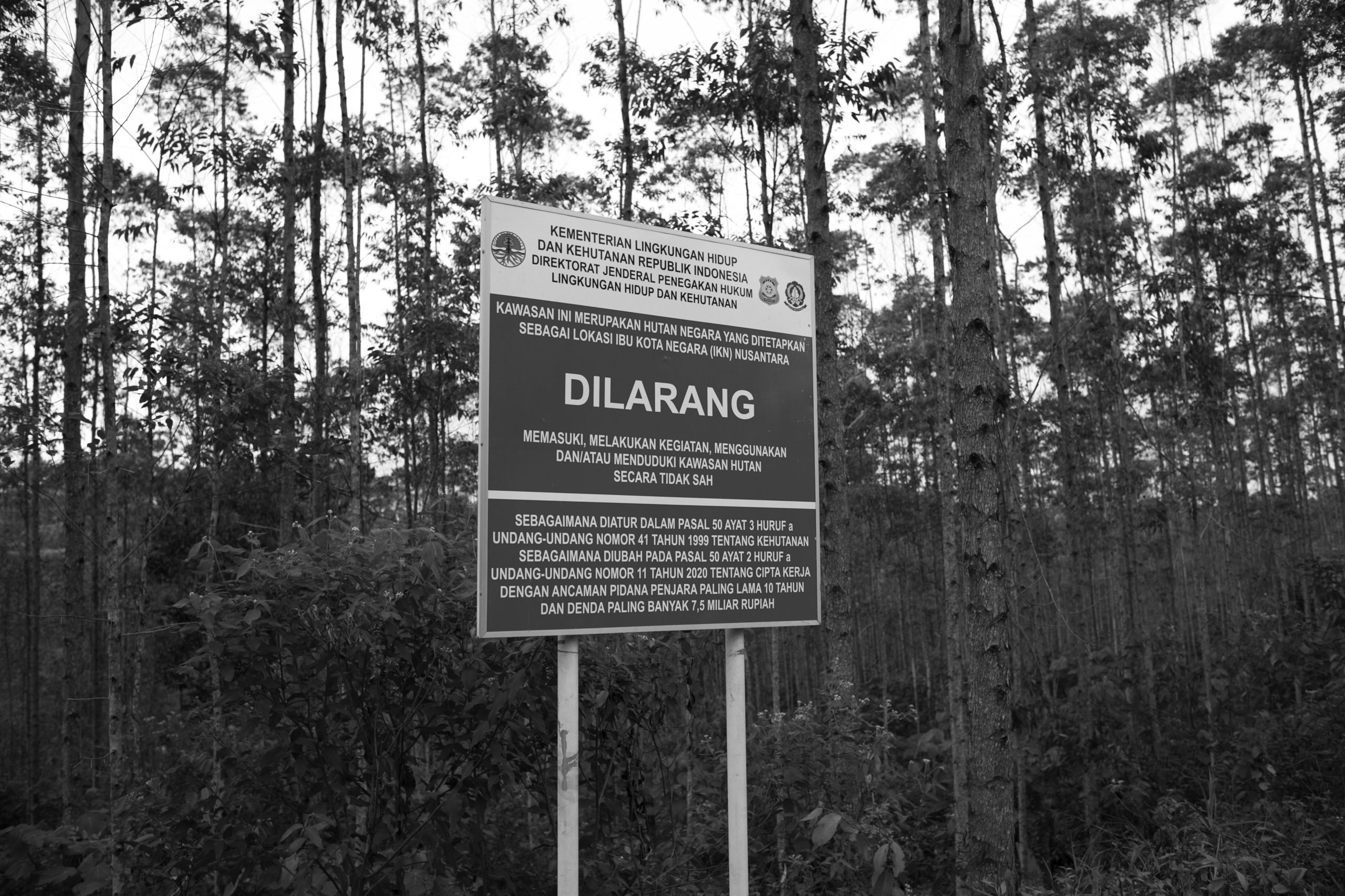
About 51 percent of the land at the site of the planned capital is currently in the hands of corporations, including forestry businesses, in the form of forest concession rights, industrial plantation forests, oil palm plantations, and mines.
Touted by the Jokowi administration as a “forest city” to-be, the site has 4,789 ha of conservation area and protected forest area that has been exploited through permits for industrial plantation forests, mining, and oil palm plantations.
More than 39,000 hectares are also subject to concession conflicts, which include overlapping forest and land use permits, according to research by Forest Watch Indonesia. These overlapping concessions are dominated by mining corporations and industrial plantation forests, as well as oil palm plantation companies.
In the 2018-2021 period, Forest Watch Indonesia found, 18,000 ha in the new capital area had been deforested.
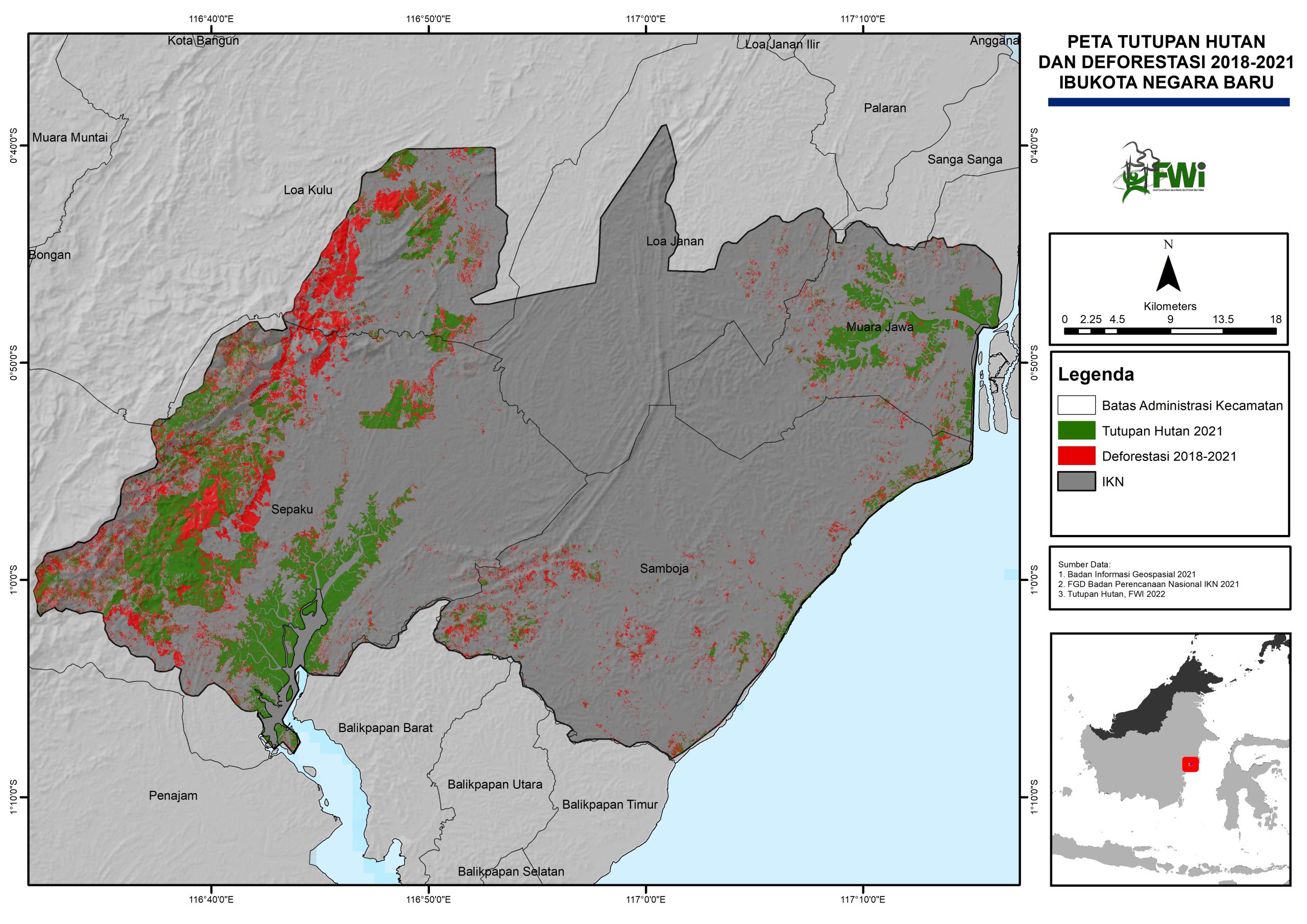
Capital For Sale
The projected cost of developing the capital is nearly Rp466 trillion, and the megaproject needs funding for its initial phase of development.
According to Jokowi administration estimates, about 80 percent, or Rp376 trillion, of the funds for the capital will come from the private sector, as well as cooperation between the government and business entities. Only 19 percent, or Rp 89.4 trillion, of the capital development funds will come from the state budget.
The Jokowi administration and its partners are still hunting for investors. Perhaps prompted by investor pullouts, the president has piled on incentive after incentive to attract funds for the new capital.
The incentives include a “relaxed” permit application process, 30-year tax holidays, 350 percent tax deductions, the right to build for 80 years (normally only 30 years) and extendable by up to another 80 years (normally only 20 years).
All this for a move that experts say will have no significant impact on national economic growth.
According to documents presented by the Institute For Development of Economics and Finance (Indef) and economists from Padjadjaran University at a House hearing, the new capital is expected to increase East Kalimantan’s GDP by 0.27 percent in the short term and 0.26 percent in the long term and increase the national GDP by only 0.2 percent.
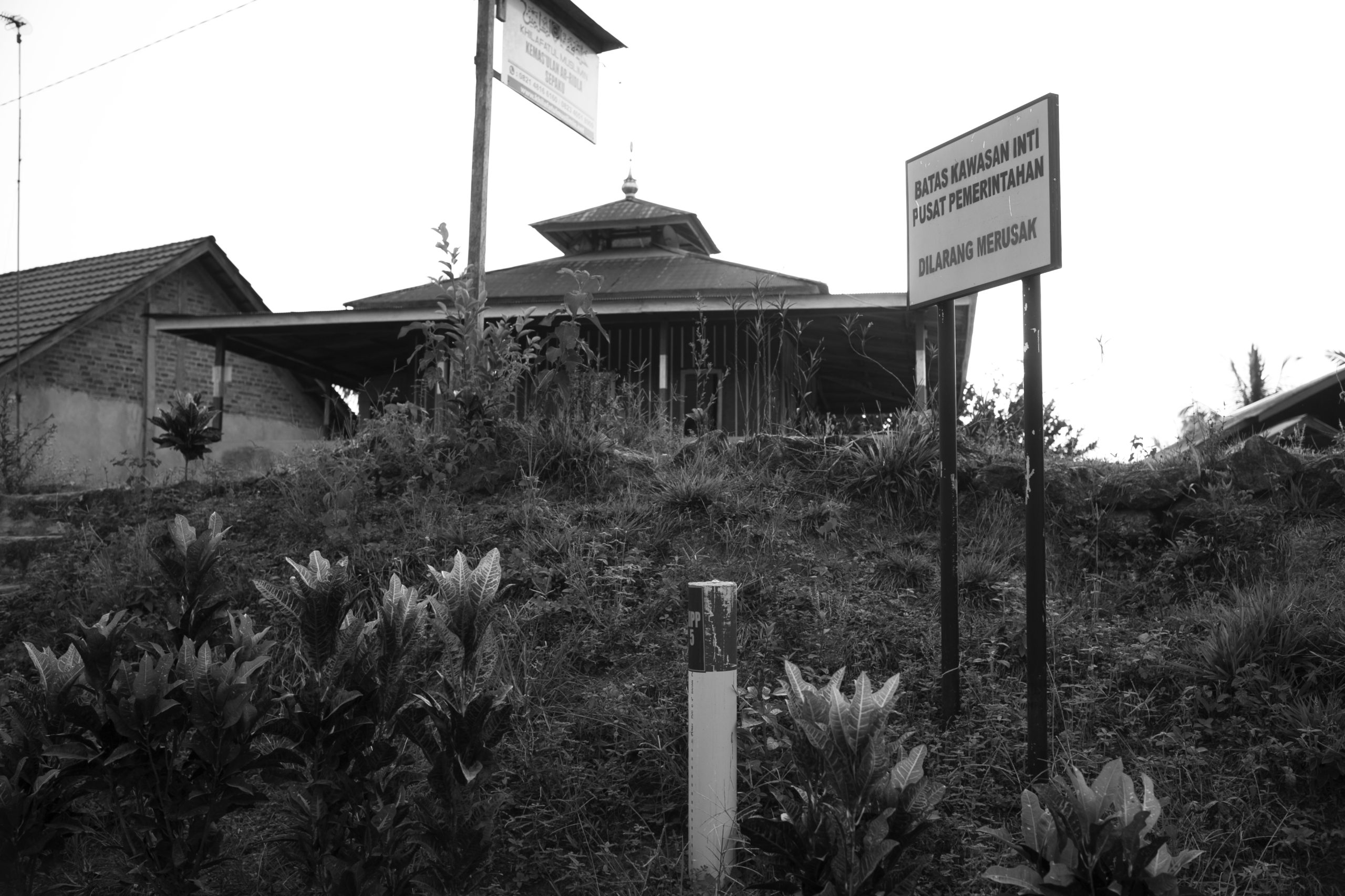
Rp 56.6t in State Funds
Meanwhile, according to Trend Asia research, Jokowi’s pet megaproject has already cost taxpayers Rp 8.42 trillion from 2017 to 2022 and is expected to cost a further Rp 48.18 trillion by 2024 for the construction of basic infrastructure and government, education, health, and security facilities.
At the Kadin event on Oct. 18, 2022, President Jokowi said moving the capital would create “economic justice”. However, the new capital project lacks interest from investors, which has driven Jokowi to offer increasingly lavish incentives that disproportionately benefit business elites, and the site of the new capital is entangled in overlapping corporate concessions that are destroying conservation areas and protected forests.
Jokowi says he wants economic equality, but in reality, only a few elites will likely benefit from the project. He aspires to have a new, green capital, but the project appears set to give coal corporations a golden opportunity to dodge their obligations to reclaim mining pits. Jokowi promises that the new capital will not strain the state budget, but it has already cost taxpayers tens of trillions of rupiah.
The new capital is another example of the consolidation of paternalistic authorities with controversial conglomerates, taking advantage of the support of powerful figures with a foot in both politics and business who are riddled with conflicting interests. The capital megaproject that President Jokowi calls “the future of Indonesia” is simply camouflage for the future interests of the nation’s oligarchs.*
Timeline of Policy Development for the New Capital
Translator: Trend Asia
This opinion piece is part of #IbuKotaBaruUntukSiapa, a collaboration involving Project Multatuli, Trend Asia, and Forest Watch Indonesia.

